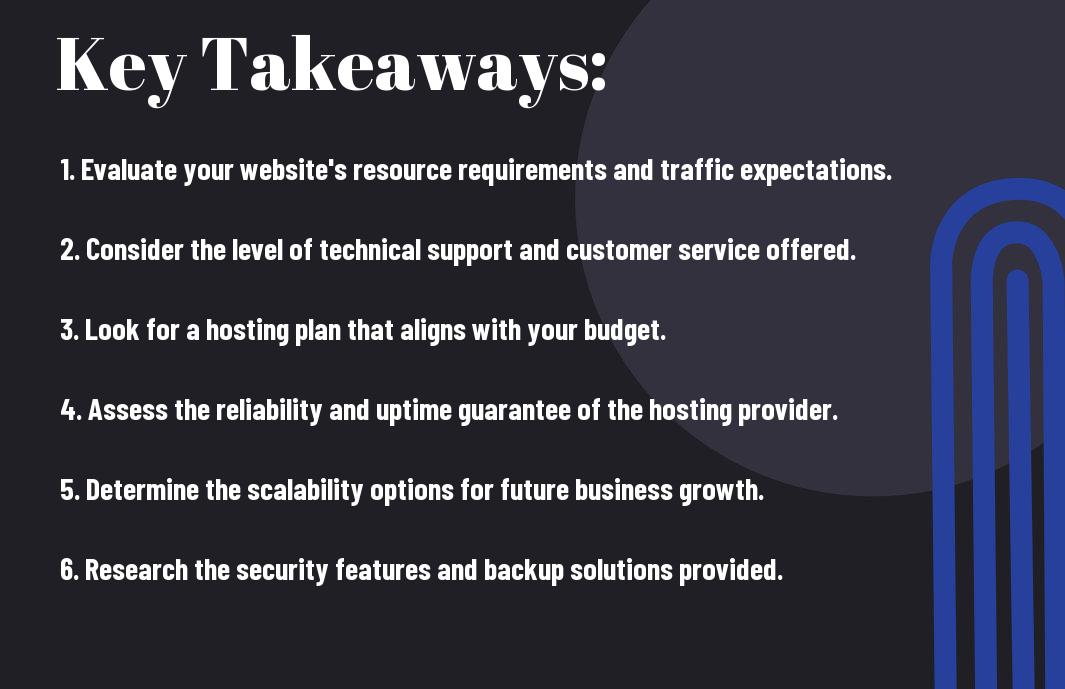When it comes to establishing an online presence for your business, selecting the right web hosting plan is crucial to your success. With a myriad of options available, it can be overwhelming to determine which plan aligns with your specific business goals. Factors such as performance, scalability, security, and customer support are paramount in making an informed decision. In this blog post, we will guide you through the process of evaluating and choosing the most suitable web hosting plan for your business needs. By the end, you will have the knowledge and confidence to select a plan that sets your business up for online success.
Key Takeaways:
- Understand your business needs: Evaluate your website’s requirements such as traffic volume, storage space, and software compatibility to select a plan that meets your specific needs.
- Consider scalability: Choose a web hosting plan that allows for growth and can accommodate increasing traffic and the addition of new features as your business expands.
- Compare features and pricing: Thoroughly research and compare different hosting providers to find a plan that offers the best combination of features, reliability, and pricing for your business goals.

Assessing Your Web Hosting Needs
Some web hosting plans may seem appealing at first glance, but it’s important to carefully assess your specific needs before making a decision. By evaluating your website’s purpose and estimating your traffic, you can choose a plan that is tailored to support your business goals.
Analyzing Your Website’s Purpose
When selecting a web hosting plan, you need to consider the purpose of your website. Are you running a personal blog, an e-commerce site, or a corporate website? Each of these purposes will require a different level of resources, such as storage, bandwidth, and security features. Additionally, consider any planned expansions or updates to your site, as these may impact your hosting needs in the future.
Estimating Your Website’s Traffic
Understanding your website’s traffic is crucial for choosing the right hosting plan. If you’re expecting high traffic volume, you’ll need a plan that can handle the influx of visitors without sacrificing performance. On the other hand, if your site is new or receives low to moderate traffic, you may be able to start with a more basic plan and upgrade as your traffic grows. It’s important to accurately estimate your traffic to avoid complications down the road.

Types of Web Hosting Services
Keep in mind that there are several types of web hosting services available, each catering to different needs and budgets. It’s important to understand the differences between them in order to make an informed decision for your website. For more detailed information, you can refer to The ultimate guide to choosing the best hosting plan – Blog.
| Service | Description |
| Shared Hosting | Affordable but limited resources |
| Virtual Private Server (VPS) Hosting | Mixture of shared and dedicated hosting |
| Dedicated Server Hosting | Exclusive use of an entire server |
| Cloud Hosting | Scalable and flexible hosting solution |
| Managed Hosting | Provider handles technical aspects |
Shared Hosting
With shared hosting, your website is hosted on a server along with many other websites. While it is the most affordable option, it also means that your resources are limited, and the performance of your website can be affected by the activities of other sites on the same server.
Virtual Private Server (VPS) Hosting
VPS hosting offers a middle ground between shared and dedicated hosting. It provides you with more control and resources than shared hosting, but it’s more affordable than dedicated hosting. This option is suitable for businesses that need more power and flexibility.
Dedicated Server Hosting
With dedicated server hosting, you have exclusive use of an entire server. This means you have full control over the server resources, allowing for high performance and security. It’s ideal for large businesses with high traffic and resource-intensive websites.
Cloud Hosting
Cloud hosting is a scalable and flexible hosting solution that allows your website to utilize the resources of multiple servers. This means that if one server fails, your website can still function using the resources from another server. It’s a reliable option for websites with fluctuating traffic.
Managed Hosting
With managed hosting, the hosting provider takes care of the technical aspects of running a website, such as server management, maintenance, and security. This allows you to focus on your business without worrying about the technical details of hosting. Any technical issues or updates are handled by the hosting provider.
Key Features to Consider
Despite the abundance of web hosting plans available, it’s important to carefully consider the key features that will impact the success of your business website. When choosing a web hosting plan, pay close attention to the following key features:
- Uptime guarantee: Ensures your website is accessible to visitors at all times
- Security measures: Protects your website and customer data from cyber threats
- Customer support: Reliable and responsive support for any technical issues
- Scalability options: Ability to easily upgrade your hosting as your website grows
This comprehensive list of features will help you make an informed decision when selecting the right web hosting plan for your business. For more detailed insights, you can read more here.
Uptime Guarantee
When it comes to your business website, uptime is crucial. A reliable web hosting company should offer a high uptime guarantee, ensuring your website is accessible to potential customers at all times. Look for a provider that offers at least a 99.9% uptime guarantee, minimizing the risk of downtime that could negatively impact your business.
Security Measures
Security is non-negotiable for your business website. Your web hosting plan should include robust security measures such as SSL certificates, firewalls, and regular malware scans to protect your website and customer data from cyber threats. Prioritize web hosts that prioritize the security of your website as much as you do.
Customer Support
Reliable customer support is essential when running a business online. Look for a web hosting provider that offers 24/7 customer support through various channels such as live chat, email, and phone. Knowing that you have a dedicated support team on standby to assist you with any technical issues can provide peace of mind.
Scalability Options
As your business grows, so should your website. It’s essential to choose a web hosting plan that offers scalability options to accommodate the increasing demands of your website. This includes the ability to easily upgrade your hosting plan, add more resources, and handle higher traffic volumes without experiencing performance issues.
Making the Decision
Unlike choosing a web hosting plan for personal use, when selecting a plan for your business, there are several factors you need to consider. It’s important to weigh the options carefully and make an informed decision that aligns with your business goals and requirements.
Comparing Hosting Plans
When comparing hosting plans, you should look at factors such as bandwidth, storage, uptime, scalability, and support. Create a table with these factors in one column and the details of the plans you are considering in the other. This will give you a clear visual comparison and help you make an informed decision based on your business needs.
Evaluating Provider Credibility
Before committing to a web hosting provider, it’s crucial to assess their credibility. Look for customer reviews, uptime guarantees, and the provider’s reputation in the industry. A reliable hosting provider should have a proven track record of providing excellent service and support to their clients.
To Wrap Up
To wrap up, choosing the right web hosting plan for your business is crucial to achieving your online goals. Consider factors such as the size of your website, the amount of traffic you expect, and the level of customer support you may need. Keep in mind that different hosting plans offer different features, so it’s important to carefully evaluate your options. By taking the time to assess your needs and compare various hosting plans, you can find the perfect fit for your business and set yourself up for success online. Remember, your web hosting plan is the foundation of your online presence, so choose wisely to support your business goals.
FAQ
Q: What factors should I consider when choosing a web hosting plan for my business?
A: When choosing a web hosting plan for your business, consider factors such as website traffic, website performance, security features, support options, and scalability.
Q: How does website traffic affect my choice of web hosting plan?
A: If your website receives high traffic, you will need a web hosting plan that offers sufficient bandwidth and server resources to handle the load without causing slowdowns or downtime.
Q: What performance considerations should I keep in mind when selecting a web hosting plan?
A: Look for a web hosting plan with fast loading times, reliable uptime, and high server availability to ensure that your website performs well and provides a positive user experience.
Q: What security features should I look for in a web hosting plan?
A: Important security features to consider include SSL certificates, regular backups, DDoS protection, firewalls, and malware scanning to protect your website and customer data from cyber threats.
Q: Why is scalability important when choosing a web hosting plan for my business?
A: Scalability allows your web hosting plan to grow with your business. Ensure that your chosen plan can accommodate increases in website traffic, data storage, and resource usage as your business expands.
CATEGORY:Web Hosting

